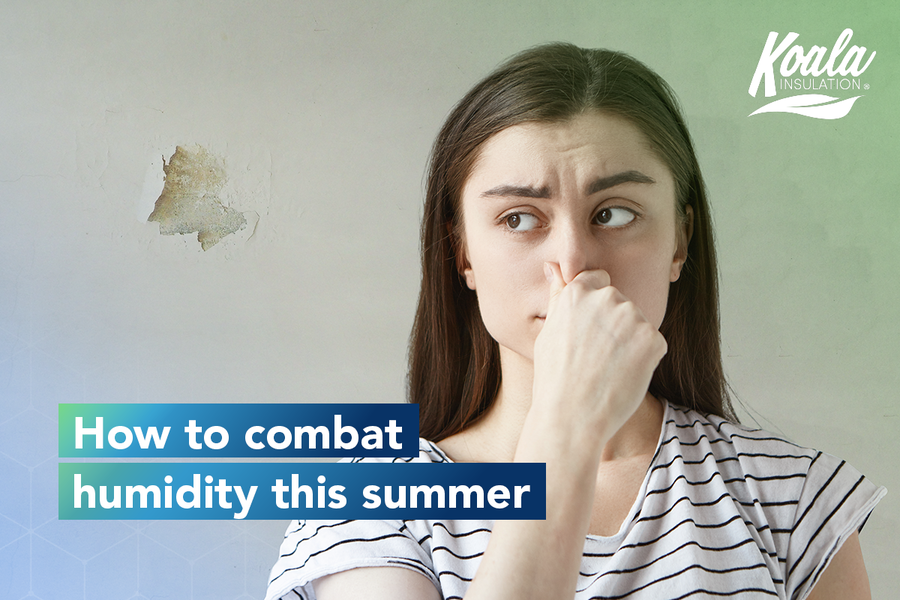How to combat humidity this summer


Here in Miami, we know that we live in the most humid part of the US and our homes always kind of feel that way too. However, that humidity can cause many problems within your home and affect its structural integrity as well as your health. You know these problems are serious if you have experienced an humidity odor in your home: a musty smell that suggests damp staleness within your walls but actually comes from mold growth, mildew and other fungal growths. Most likely, you have tried to cover up any unpleasant odors in your home with many air fresheners, candles or other products that only give temporary relief but do not provide long-term solutions. It’s time to combat the humidity and moisture within your home now!
What causes moisture in your home?
Even though humidity levels during the Miami summer are easily over 80% – we’re in a tropical climate zone after all! – the outside air is not the only influencing factor when it comes to moisture problems in your home. There are many everyday activities that actually increase the humidity levels, especially if you have a smaller space:
- Structural problems – moisture is the enemy to many materials and can cause rust and corrosion on metals, swells and warps on wood (which for example leads to doors not closing well) and mold and water marks on your drywall.
- Breathing – not something we’re trying to limit, right? However, the air we release can be water-saturated up to 100% and the more people you have in a smaller space, the more humid it gets. Just think about the condensation on a car window on a long drive with your entire family.
- Heat- and water-related activities – many of us love a long, hot shower or we forgo turning on the extractor hood because we can’t hear the music or tv over it while we cook our pasta. While cooking and bathing are essential activities in our lives, there are small ways to help with humidity like shorter showers or using that extractor hood.
- Pipe Leaks – When was the last time you had your pipes checked? The smallest corrosion or hole on a pipe can leave water dripping and cause moisture problems in that specific area of your home.
- Houseplants – some of us like to have a little jungle inside and know how much joy plants can bring. Nevertheless, plants undergo evapotranspiration which means they are releasing water through their leaves. While this seems like a small amount that you can disregard, it can actually add up with all the factors in our already humid climate.
- Damp Soil – the crawlspace of your home and the soil below it might be damp after the next thunderstorm and if it stays wet for a while, the moisture rises and can actually make the rooms above the crawlspace humid.
What does humidity do to my home?
Mold & Mildew
Humidity, in combination with darkness like in your attic,closet or basement, is the perfect breeding ground for mold, mildew and other fungi. Mold can aggravate asthma, but even if you don’t suffer from any respiratory conditions, you’re likely to find yourself coughing, feeling congested or with headaches. In spaces with little ventilation, mold will develop that strong smell that we mentioned in the beginning and stink up your home.
Air Pollutants
Air pollutants like dust mites enjoy humid environments and can also put your lungs under duress. In general, it is harder to breathe in humid environments as the hot air narrows your airways. For people with asthma, humid air can worsen their condition. That’s why it’s important to keep the air in your home at a good humidity level and temperature to allow for easy breathing without any pollutants or spores.
Higher Utility Bills
Humidity makes you feel uncomfortable in your home which may lead to you cranking up your air conditioning. This not only increases your monthly energy bills but also puts a strain on your air conditioning unit which means that it will have to be replaced sooner rather than later.
How do insulation and air sealing help with moisture & humidity problems?
Insulation has many benefits that can help with a humid home. Depending on the type of insulation, an airtight barrier can be created either by the insulation itself or the process of air sealing, an extra step before insulation that is useful in our hot climate and very efficient in combating the humidity. Without an airtight barrier between your home and the outside world, warm humid air can enter your home through little cracks and create moisture problems. Air sealing will close those cracks and crevices and make sure that air flow is limited.
Some insulation materials also create a vapor barrier which prevents water vapor from passing through the insulation and entering other rooms in your home.
Another way insulation helps with moisture problems is its ability to control the temperature in your home. If your home is with a steady temperature all throughout, there are no uncomfortably hot areas that will potentially meet cold points in the wall (e.g. right below your A/C) and therefore create condensation and moisture. Keeping the temperature steady therefore helps keeping the humidity levels more regular as well.
What is the best type of insulation against humidity?
Any type of insulation will somehow help with humidity problems. However, there are definitely some types of insulation that will do a better job. Spray Foam Insulation is not only known for its great R-Value but, in its closed-cell version, also provides air sealing properties, meaning that it can basically be a 2-in-1 to keep both heat and humidity out of your attic. The open-cell version as well as other types of insulation work best in combination with air sealing to obtain a perfect barrier against the heat and humidity.
In combination with air sealing, Fiberglass insulation is the optimal solution for the humid Florida weather. Fiberglass is made from spun glass and therefore does not absorb or hold water which means that it will not deteriorate from moisture exposure. Additionally, the glass-based material does not serve as food for mold (or other fungi, insects or pests!) and does therefore not support mold growth.
Conclusion
There are many reasons why you should lower the humidity in your Miami home but not many viable solutions. One of the most effective ways of combating moisture problems is to first get a free evaluation with our team of Koala Insulation of South Miami to see where exactly your moisture problems are coming from and to get a professional air sealing and insulation installation in your attic. Not only will these two additions to your attic improve your, your home’s and your family’s health but also considerably lower your energy bills and increase the comfort of your home.
Find Your Location


Get a quote


